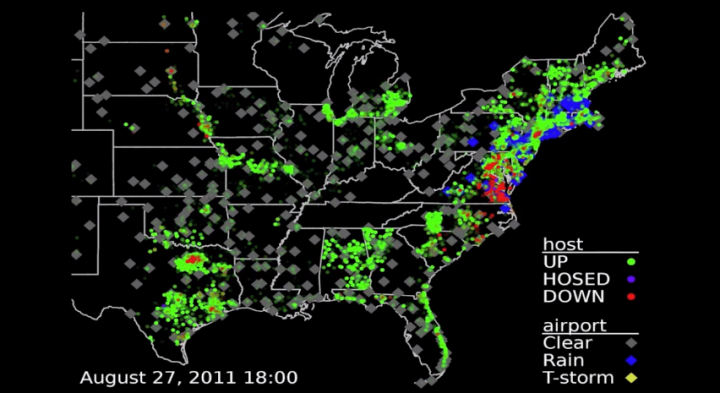Pingin' In The Rain
When severe weather events occur, it comes as no surprise that Internet connectivity and service may suffer latency or failure, leaving users without a way to interact with their favorite internet sites. Aaron Schulman has devised a way to measure the relative connectivity of ISPs (Internet Service Providers) by examining IP addresses with his well-regarded network measurement project, entitled Pingin’ in the Rain. With contributing work from Professor Neil Spring and fellow graduate students Ramakrishna Padmanaban and Youndo Lee, Aaron’s project uses a tool called ThunderPing to measure the connectivity of residential internet ISPs before, during, and after a severe weather event. ThunderPing tracks storm predictions via the National Weather Service, and finds IP addresses in a given geographic location to determine what, if any, impact a thunderstorm, ice storm, tornado or hurricane may have. ThunderPing determines what IP addresses should be used during a given alert, and uses geographically diverse PlanetLab hosts to pings (or contact) these various IP addresses in eleven minute intervals for up to six hours before or after a given weather event.
The ultimate goal of the Pingin’ in the Rain project is to help better understand a given network’s reliability in areas that depend upon various residential internet service types. This exciting work is in its genesis, and promises to provide insight into various types of ISPs and their responses to and reliability during severe weather events. Schulman and Spring examine several types of these providers (DSL, Cable and Satellite) and compare their response rates while pinging ISPs during weather events to determine if ISPs are functioning or not. The true challenge of a project of this nature is to determine what role the weather has in affecting the Internet as there are other factors that may contribute to latency or failure—these factors can include congestion, outages caused by other failures or unanticipated network events.
Pingin’ in the Rain has been the subject of IEEE Spectrum and it is the subject of the first Computer Science Department Podcast, Byte-Sized Stories. You are welcome to read more about the project or listen to the Podcast.

